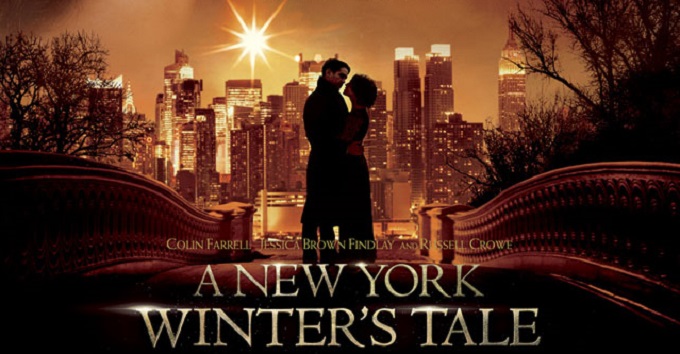A New York Winter’s Tale Review

The Plot:
A good hearted burglar strikes up an unlikely and miraculous romance with a beautiful heiress in New York in 1914, but a demonic gangster and the devil himself are determined to put a stop to their love. However, a hundred years later their love continues to change the world and inspire genuine miracles.
The Good:
Downtown Abbey star Jessica Brown Findlay has a luminous aristocratic beauty and delicate dramatic delivery that fits perfectly with the role of a terminally ill heiress. The young actress works hard to carry the demanding responsibility of both narrating the film and serving as it’s most ethereal figure. Her charms help soften some of the film’s more awkward and heavy handed dialogue at the very least.
Colin Farrell plays comfortably to type as a roguish orphan thief instantly transformed by the discovery of true love. His handsome face and soft Irish accent go some way to overcoming a questionable haircut and unashamedly fantastical script. He clearly strains to inject actual emotion into an implausible tale burdened with flying cgi horses and religious themed melodramatics.
Russell Crowe also lends a little credibility to far-fetched proceedings by making his demonic gangster Pearly Soames at least effectively menacing. It’s a typically snarling and brutish performance from the bullish Australian actor. Likewise Will Smith proves an unlikely but welcome distraction in a cameo as Lucifer himself.
The film’s most valuable and consistent redeeming feature is actually a memorable musical score from master composer Hans Zimmer. A haunting and elegant soundtrack helps rescue the film from a script that oscillates wildly between randomness and predictability. Giving the film a far more convincing romantic tone and atmosphere than it would otherwise have been capable of. Music is repeatedly the film’s saving grace, pun intended.
The Bad:
Writer Akiva Goldsman has a deeply schizophrenic CV that glitter with great work like a time to kill, a beautiful mind and fringe; but is equally tarnished by being culpable for batman & robin or practical magic. With Winter’s Tale he makes an inauspicious directorial debut, that demonstrates technical ability but lacks a script to match its lush cinematography. In truth the bestselling book which inspires the film fails to transfer its literary magic to screen.
The film struggles often to tread an awkward balance between grounded period drama and outlandish fantasy. Even the characters themselves seem confusingly unaware of just how the film’s more supernatural elements are supposed to integrate into what would have been an otherwise straightforward romantic drama. The film often takes literal and metaphorical leaps into the absurd that ask an awful lot of an audience. Perhaps the original book was able to more delicately integrate the two worlds.
The film has two death scenes which are particularly overplayed and unconvincing. It’s especially unfortunate that the film ironically regards these two embarrassing moments as its most pivotal and profound plot points.
The Ugly Truth:
Winter’s Tale has likeable leads and a wonderful soundtrack, but that can’t entirely disguise a script that fails to be as emotionally profound as it clearly aspires to be.
Check out Red Carpet interviews below from the London Premiere: